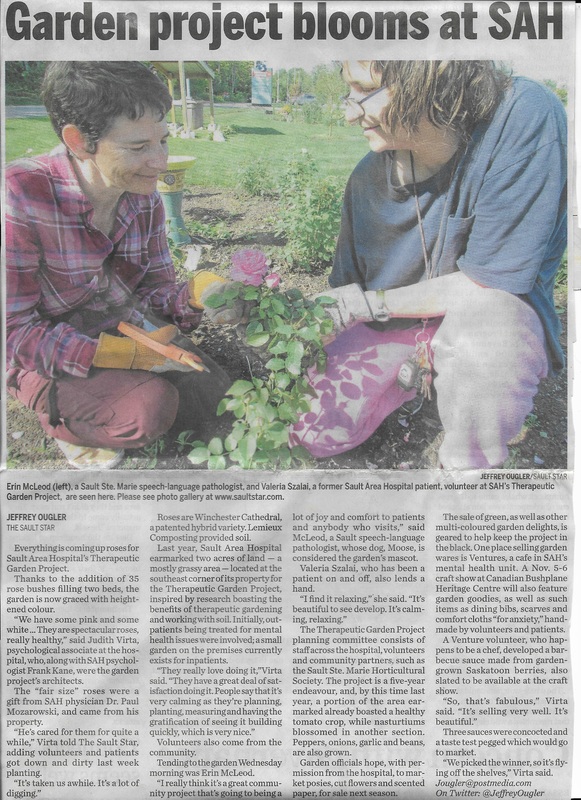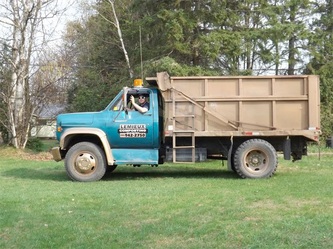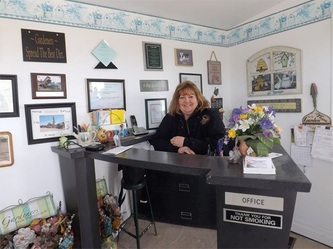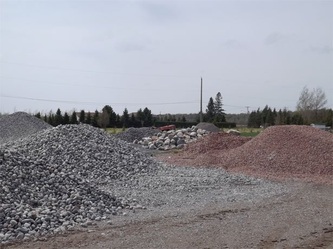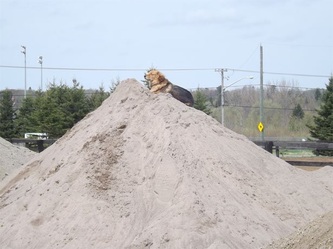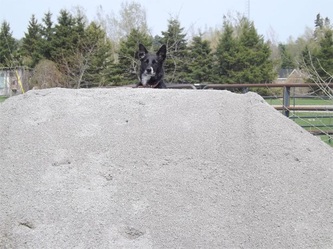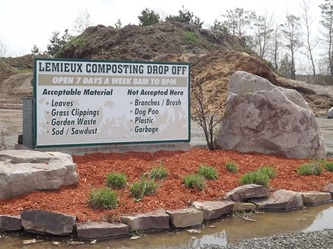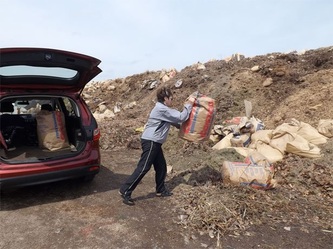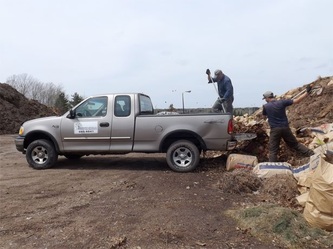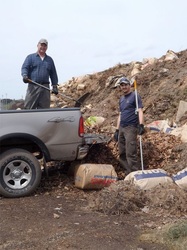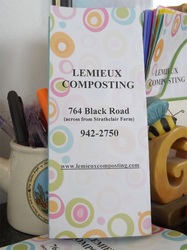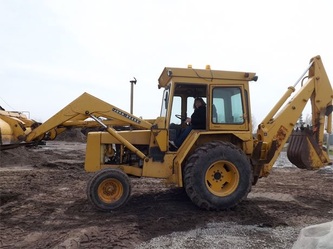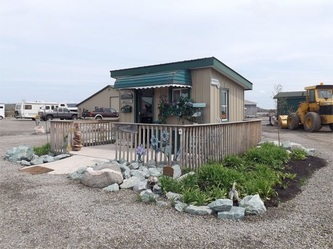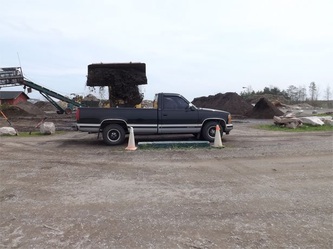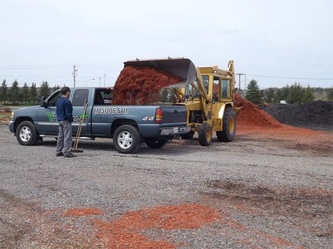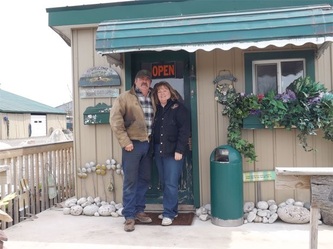Lemieux Composting in the news! Stories below:
Garden project blooms at SAH - Sept 23 2016
That's a lot of pumpkin!
It was everything gourds Saturday afternoon at the Roberta Bondar Pavilion as the Sault celebrated the 4th annual Pumpkin Festival.
The day’s feature, the popular weigh-off event, tipped the scales with a total of 2,702.5 lbs worth of pumpkin participating in the competition.
Just 5 lbs separated first and second place in the heavyweight category, with KeiranO’Neill’s 597.5 lb giant narrowly beating the Ermatinger-Clergue Junior Gardeners’ 592 lb beast.
“An early start and lots of love” is O’Neill’s secret to growing the award-winning pumpkin.
Although this was his first time entering the weigh-off, he told SooToday he’s been growing pumpkins for four seasons.
“I really enjoy it, watching the growth and development,” he said. “This one grew 300 lbs in the first two weeks in August. It was pretty impressive to watch.”
While O’Neill said he and his family will eat some of the winning pumpkin, he’s looking forward to “just going at it with a knife” to carve it into a jack-o-lantern.
The full pumpkin weigh-off results were as follows:
Heavyweight category
Keiran O’Neill - 597.5 lbs
Ermatinger-Clergue Junior Gardeners - 592 lbs
John Forta - 244.5 lbs
Evanna - 235 lbs
Ian McKenzie - 219 lbs
Alanna Storr - 134.5 lbs
Junior category
Aurora McKenzie - 183.5 lbs
Gabe Rector - 117.5 lbs
Tiia and Ava Keranen - 107 lbs
Hailey Trudeau - 75 lbs
Jorla Rector - 62.5 lbs
William McGrath - 44.5 lbs
Also included in Saturday’s festivities was the taste-off featuring pumpkin delicacies from Shabby Motley, Dish Espresso Bar, Cafe Natura, and the Pastry Shoppe.
When the tasting ended, it was the scrumptious pumpkin monkey bread with pumpkin caramel drizzle from Dish that took the prize.
The day’s feature, the popular weigh-off event, tipped the scales with a total of 2,702.5 lbs worth of pumpkin participating in the competition.
Just 5 lbs separated first and second place in the heavyweight category, with KeiranO’Neill’s 597.5 lb giant narrowly beating the Ermatinger-Clergue Junior Gardeners’ 592 lb beast.
“An early start and lots of love” is O’Neill’s secret to growing the award-winning pumpkin.
Although this was his first time entering the weigh-off, he told SooToday he’s been growing pumpkins for four seasons.
“I really enjoy it, watching the growth and development,” he said. “This one grew 300 lbs in the first two weeks in August. It was pretty impressive to watch.”
While O’Neill said he and his family will eat some of the winning pumpkin, he’s looking forward to “just going at it with a knife” to carve it into a jack-o-lantern.
The full pumpkin weigh-off results were as follows:
Heavyweight category
Keiran O’Neill - 597.5 lbs
Ermatinger-Clergue Junior Gardeners - 592 lbs
John Forta - 244.5 lbs
Evanna - 235 lbs
Ian McKenzie - 219 lbs
Alanna Storr - 134.5 lbs
Junior category
Aurora McKenzie - 183.5 lbs
Gabe Rector - 117.5 lbs
Tiia and Ava Keranen - 107 lbs
Hailey Trudeau - 75 lbs
Jorla Rector - 62.5 lbs
William McGrath - 44.5 lbs
Also included in Saturday’s festivities was the taste-off featuring pumpkin delicacies from Shabby Motley, Dish Espresso Bar, Cafe Natura, and the Pastry Shoppe.
When the tasting ended, it was the scrumptious pumpkin monkey bread with pumpkin caramel drizzle from Dish that took the prize.
Wood, paint and memories
Sootoday, June 7 2016
Over 100 vets and other loved ones honoured on D-Day
Royal Canadian Legion Branch 25 is justifiably proud to maintain all of its traditions.
While keeping up old traditions, it continued with a newer one Monday to mark the anniversary of D-Day and remember veterans and other loved ones, with the help of volunteers and a local business.
The full text of a release from Royal Canadian Legion Branch 25 follows.
*************************
In summer 2015 there was an idea formulated throughout Branch 25 that we should ‘plant’ poppies in memory of those veterans or other loved ones we want to have remembered.
During that summer, and with the help of wonderful people who donated wood and cut out the poppies, donated paint and painting, and donated time to write names on each poppy, we were able to ‘plant’ our poppies during Legion week in September.
The best surprise was when Lemieux Composting donated the white stone that we use in the garden.
We removed that first batch November 12, with the promise that we would re-plant them on June 6 (D-Day).
The idea kept growing and the volunteers kept supplying the wood, cutting and painting the poppies and inscribing names over the winter and spring.
Lemieux Composting again stepped up, so we now have two gardens at Branch 25.
With our piper Parker Bowes playing in the background, we were able to plant 103 poppies on D-Day.
That number does not include the many that people took to grave sites, to family plots, or their own personal gardens.
Branch 25 cannot express its thanks enough to everyone who purchased a $10 poppy and to our volunteers.
Thank you, Lemieux Composting; your community spirit is astounding.
It was never expected and we very much appreciate your generous donation.
*************************
Over 100 vets and other loved ones honoured on D-Day
Royal Canadian Legion Branch 25 is justifiably proud to maintain all of its traditions.
While keeping up old traditions, it continued with a newer one Monday to mark the anniversary of D-Day and remember veterans and other loved ones, with the help of volunteers and a local business.
The full text of a release from Royal Canadian Legion Branch 25 follows.
*************************
In summer 2015 there was an idea formulated throughout Branch 25 that we should ‘plant’ poppies in memory of those veterans or other loved ones we want to have remembered.
During that summer, and with the help of wonderful people who donated wood and cut out the poppies, donated paint and painting, and donated time to write names on each poppy, we were able to ‘plant’ our poppies during Legion week in September.
The best surprise was when Lemieux Composting donated the white stone that we use in the garden.
We removed that first batch November 12, with the promise that we would re-plant them on June 6 (D-Day).
The idea kept growing and the volunteers kept supplying the wood, cutting and painting the poppies and inscribing names over the winter and spring.
Lemieux Composting again stepped up, so we now have two gardens at Branch 25.
With our piper Parker Bowes playing in the background, we were able to plant 103 poppies on D-Day.
That number does not include the many that people took to grave sites, to family plots, or their own personal gardens.
Branch 25 cannot express its thanks enough to everyone who purchased a $10 poppy and to our volunteers.
Thank you, Lemieux Composting; your community spirit is astounding.
It was never expected and we very much appreciate your generous donation.
*************************
Boost a local bat - give it a home on your range
Sault This Week, May 31, 2016
One bat can eat a lot of mosquitoes, says Peter McLarty, vice-chair of Clean North.
Numbers by the experts run from 600 to 1,500 an hour and 7,000- to 10,000 a night.
But urban expansion and the continuous spread of white-nose syndrome have made it difficult for many bat species to find suitable places to live.
Bat boxes provide relief and encourage bats to inhabit an area, McLarty continued.
The creatures do a wonderful job of keeping insect populations in check, which means they also work as an insect repellent for gardens or crops, he said.
Such “primary insect control” dovetails with the mandate of Clean North, a local environmental organization.
“We are trying to do everything organically and pesticide free,” McLarty said.
Bat boxes, built by volunteers and made available through Clean North for the past 15 years, are an alternative to chemical spraying, he said in a telephone interview.
“When we started there were problems with West Nile virus.
“I think it was in about 2001. And they were doing mass sprayings in Winnipeg, going up and down the streets with foggers at night trying to get rid of the mosquitoes,” he said.
“All populations have natural controls, and anytime we try to interfere with chemical man-made things, they are short term.
“Once you start applying pesticides you got to keep applying pesticides because the natural predators, the bats themselves, will die off if there is nothing for them to feed on,” McLarty said.
“So the nature way is maybe a little bit more painful, but it is far more successful and sustainable”
Bat houses are small boxes that anyone can easily put up.
McLarty and volunteers build all of the bat houses for Clean North.
They make them out of lumber or plywood when they can get enough supplied; otherwise they have to buy particleboard. Recycled screen is used to put a friction surface on the inside of a panel so the bats can easily climb up.
For do-it-yourselfers, the Canadian Wildlife Federation provides free plans on its website www.cwf-fcf.org (Search “bats” on the home page.)
Clean North sells its bat boxes for $35 via its website (www.cleannorth.org) or at community events attended by the organization throughout the year.
Lemieux Composting sells bat boxes on behalf of Clean North and has done so for several years.
Co-owner Phil Lemieux said the group’s objectives “fit right along with us and what we do.
“We are an environmentally friendly business and they are an environmentally friendly, non-profit organization.
“We move the rain barrels for them and we also distribute their bat houses.”
Bats come out of hibernation from caves or mines in March or April.
When they wake they need some sort of dark and warm housing during the day.
Females need a safe place in June or July to give birth to their pups, says the CWF website.
“A lot of people find that it is a unique gift when they are looking for a Father’s Day gift, which is in June, so it’s perfect timing,” said Kathy Lemieux, Phil’s wife and partner in the business.
The Lemieux have the boxes on display at their Black Road site, “so people can see what they look like,” said Kathy.
An easily accessible location and regular store hours, 8 a.m. to 8 p.m. Monday to Friday and until 2 p.m. Saturdays have helped Clean North move its bat houses.
Last year the Lemieux had so many requests for bat houses that they sold out.
“The trend is moving toward buying bat houses and utilizing them,” said Kathy. “A lot of people have had bats in an attic or in a building and they want to get it closed up.
“One way to prevent the bats from trying to get into that same area is to offer them a new home. So we do find, people who have had trouble with bats — where they don’t want them — will put up bat houses and then seal off and close where they’ve been invasive,” she said.
“And it works. The bats go to their new home as opposed to trying to get in where they used to live.”
Bat boxes could help against white nose syndrome which has taken a huge toll on the North American bat population. Click here
One bat can eat a lot of mosquitoes, says Peter McLarty, vice-chair of Clean North.
Numbers by the experts run from 600 to 1,500 an hour and 7,000- to 10,000 a night.
But urban expansion and the continuous spread of white-nose syndrome have made it difficult for many bat species to find suitable places to live.
Bat boxes provide relief and encourage bats to inhabit an area, McLarty continued.
The creatures do a wonderful job of keeping insect populations in check, which means they also work as an insect repellent for gardens or crops, he said.
Such “primary insect control” dovetails with the mandate of Clean North, a local environmental organization.
“We are trying to do everything organically and pesticide free,” McLarty said.
Bat boxes, built by volunteers and made available through Clean North for the past 15 years, are an alternative to chemical spraying, he said in a telephone interview.
“When we started there were problems with West Nile virus.
“I think it was in about 2001. And they were doing mass sprayings in Winnipeg, going up and down the streets with foggers at night trying to get rid of the mosquitoes,” he said.
“All populations have natural controls, and anytime we try to interfere with chemical man-made things, they are short term.
“Once you start applying pesticides you got to keep applying pesticides because the natural predators, the bats themselves, will die off if there is nothing for them to feed on,” McLarty said.
“So the nature way is maybe a little bit more painful, but it is far more successful and sustainable”
Bat houses are small boxes that anyone can easily put up.
McLarty and volunteers build all of the bat houses for Clean North.
They make them out of lumber or plywood when they can get enough supplied; otherwise they have to buy particleboard. Recycled screen is used to put a friction surface on the inside of a panel so the bats can easily climb up.
For do-it-yourselfers, the Canadian Wildlife Federation provides free plans on its website www.cwf-fcf.org (Search “bats” on the home page.)
Clean North sells its bat boxes for $35 via its website (www.cleannorth.org) or at community events attended by the organization throughout the year.
Lemieux Composting sells bat boxes on behalf of Clean North and has done so for several years.
Co-owner Phil Lemieux said the group’s objectives “fit right along with us and what we do.
“We are an environmentally friendly business and they are an environmentally friendly, non-profit organization.
“We move the rain barrels for them and we also distribute their bat houses.”
Bats come out of hibernation from caves or mines in March or April.
When they wake they need some sort of dark and warm housing during the day.
Females need a safe place in June or July to give birth to their pups, says the CWF website.
“A lot of people find that it is a unique gift when they are looking for a Father’s Day gift, which is in June, so it’s perfect timing,” said Kathy Lemieux, Phil’s wife and partner in the business.
The Lemieux have the boxes on display at their Black Road site, “so people can see what they look like,” said Kathy.
An easily accessible location and regular store hours, 8 a.m. to 8 p.m. Monday to Friday and until 2 p.m. Saturdays have helped Clean North move its bat houses.
Last year the Lemieux had so many requests for bat houses that they sold out.
“The trend is moving toward buying bat houses and utilizing them,” said Kathy. “A lot of people have had bats in an attic or in a building and they want to get it closed up.
“One way to prevent the bats from trying to get into that same area is to offer them a new home. So we do find, people who have had trouble with bats — where they don’t want them — will put up bat houses and then seal off and close where they’ve been invasive,” she said.
“And it works. The bats go to their new home as opposed to trying to get in where they used to live.”
Bat boxes could help against white nose syndrome which has taken a huge toll on the North American bat population. Click here
Volunteers Get “Down and Dirty” in SAH’s Therapeutic Garden
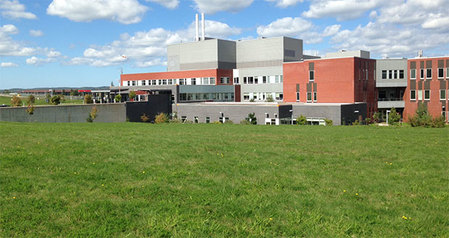
Sault Online
Sept 14th, 2015
Sault Area Hospital (SAH) is developing a community Therapeutic Garden over the next five years on two acres of land located at the southeast corner of the SAH property. Led by SAH’s Outpatient Mental Health Services and a dedicated planning committee, the idea was inspired by the psychological research behind therapeutic gardening and working with soil.
“Research has shown that gardening not only relieves stress, builds resilience, and improves healing, but it can actually slow down the progress of Alzheimer’s disease,” explains Judith Virta, Psychological Associate and lead for the project. “Gardeners have an increased zest for life, they tend to cope better, sleep better and have a lowered risk for osteoporosis and diabetes,” she adds. The goal of the Therapeutic Garden Project is to support and integrate patients into the community by providing them with an activity that is engaging and satisfying. “Our hope is that this project will also go a long way to reducing stigma of all medical conditions and illnesses.”
Virta says that the garden is not only for hospital patients, staff and visitors to enjoy but, it is an activity in which the entire community can explore and get involved. “Once completed, the garden will not only provide visitors with a beautiful and calming environment to sit in or walk through, but also offer them the opportunity to garden, whether it be working inside the greenhouse, planting flowers in a garden box or pruning bushes.”
The planning committee for the Therapeutic Garden Project consists of staff across the hospital, volunteers and community partners such as the Horticultural Society. According to Virta, garden volunteers took advantage of the warm weather this summer to “get down and dirty” and do some work in the garden. “We had great volunteers, nice weather and enough funds to purchase some soil so we got started by setting up our butterfly garden,” said Virta.
“We are very thankful to Kathy and Phil Lemieux, owners of Lemieux Composting. Not only did they provide us with a great deal on soil, they are making a generous and ongoing donation to the garden,” she adds. “We also appreciate their collaboration in sharing their expertise and suggestions regarding types of products to use for gravel walkways, structures and raised beds that will be helpful for those in wheelchairs.”
“We have been very fortunate that many people have come forward to offer plants and seedlings, as well as volunteering their time and landscaping expertise,” noted Kim LeBlanc-Turpin, Volunteer Fundraising Consultant for the project. “Next steps include raising more funds to pay for the rental of equipment to excavate the land, the purchase of a greenhouse, benches, flower and plant beds, etc.
Anyone interested in volunteering is asked to contact the SAH Volunteer Resources Department at (705)
759-3434, ext. 5323. To make a donation of plants, soil or equipment, please call Judith Virta at (705) 759-3434, ext. 4614. To make a monetary donation to the Mental Health Fund to help support capital equipment needs in this area, visit www.sahfoundation.com.
For more information about SAH, visit us at www.sah.on.ca.
Sept 14th, 2015
Sault Area Hospital (SAH) is developing a community Therapeutic Garden over the next five years on two acres of land located at the southeast corner of the SAH property. Led by SAH’s Outpatient Mental Health Services and a dedicated planning committee, the idea was inspired by the psychological research behind therapeutic gardening and working with soil.
“Research has shown that gardening not only relieves stress, builds resilience, and improves healing, but it can actually slow down the progress of Alzheimer’s disease,” explains Judith Virta, Psychological Associate and lead for the project. “Gardeners have an increased zest for life, they tend to cope better, sleep better and have a lowered risk for osteoporosis and diabetes,” she adds. The goal of the Therapeutic Garden Project is to support and integrate patients into the community by providing them with an activity that is engaging and satisfying. “Our hope is that this project will also go a long way to reducing stigma of all medical conditions and illnesses.”
Virta says that the garden is not only for hospital patients, staff and visitors to enjoy but, it is an activity in which the entire community can explore and get involved. “Once completed, the garden will not only provide visitors with a beautiful and calming environment to sit in or walk through, but also offer them the opportunity to garden, whether it be working inside the greenhouse, planting flowers in a garden box or pruning bushes.”
The planning committee for the Therapeutic Garden Project consists of staff across the hospital, volunteers and community partners such as the Horticultural Society. According to Virta, garden volunteers took advantage of the warm weather this summer to “get down and dirty” and do some work in the garden. “We had great volunteers, nice weather and enough funds to purchase some soil so we got started by setting up our butterfly garden,” said Virta.
“We are very thankful to Kathy and Phil Lemieux, owners of Lemieux Composting. Not only did they provide us with a great deal on soil, they are making a generous and ongoing donation to the garden,” she adds. “We also appreciate their collaboration in sharing their expertise and suggestions regarding types of products to use for gravel walkways, structures and raised beds that will be helpful for those in wheelchairs.”
“We have been very fortunate that many people have come forward to offer plants and seedlings, as well as volunteering their time and landscaping expertise,” noted Kim LeBlanc-Turpin, Volunteer Fundraising Consultant for the project. “Next steps include raising more funds to pay for the rental of equipment to excavate the land, the purchase of a greenhouse, benches, flower and plant beds, etc.
Anyone interested in volunteering is asked to contact the SAH Volunteer Resources Department at (705)
759-3434, ext. 5323. To make a donation of plants, soil or equipment, please call Judith Virta at (705) 759-3434, ext. 4614. To make a monetary donation to the Mental Health Fund to help support capital equipment needs in this area, visit www.sahfoundation.com.
For more information about SAH, visit us at www.sah.on.ca.
Your Friendly Neighbourhood Composter and Then Some
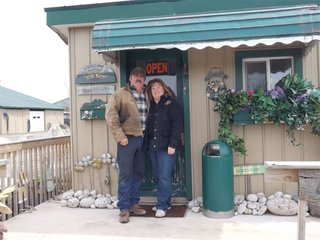
Steffanie Petroni for local2 sault ste. marie
May 25th, 2013 at 10:59am
At one time the family business was a gathering place for the community and an establishment that would guarantee good service and a reliable product. These days we’re overrun with big box stores where people wrest for deals and check their watches as they wait in check-out lines, pinned between shopping carts.
Lemieux Composting has the exact opposite feeling. Locally owned by Phil and Kathy Lemieux the family run business has a park like atmosphere. The regulars trickle in and out over the day and catch up with the owners or stroll around in the fresh air, with a take-out coffee, as they check out landscape material. The couple’s children, Brandon and Brittany, lend a hand when their other work schedules permit.
The business was started by Phil’s dad and primarily carried top soil. In 1990, Lemieux’s began developing compost and bringing in landscaping supplies such as wood mulches, gravel and stone. Phil and Kathy carries over 35 materials for the gardener and landscaper.
Lemieux’s will receive your leaves, grass clippings, garden waste and sod- no branches. Material can be brought out to the site and left in brown bags or dumped out from plastic bags. The service is free to the community. The free-drop off is open 7 days a week from 8 a.m. to 8 p.m. including holiday weekends.
Making compost isn’t for rookies. Lemieux’s is the only compost dealer in the area and is licensed by the Ministry of Environment. Compost is a regulated product and process. One criterion is that compost material reaches a temperature of 131 degrees Fahrenheit for a minimum of 15 consecutive days. This part of the process means that if there is a dandelion in the mix the seeds will be killed.
The compost is cured for six months. Lemieux’s also tests for metals, organic matter, ph and moisture content. Kathy adds, "Our ph is neutral which is good for people to know if they’re planting vegetables.”
When asked how to manipulate temperatures to such an extreme Kathy explained with a laugh, “Oh we have a secret recipe. We do put a number of materials together and we have an industrial composter. That combined with our knowledge and experience ensures that you’re getting an exceptional product. We’re very good at it.”
Both Kathy and Phil grew up in the Sault and both are civic minded. “We encourage kids to plant and grow and support community gardens. Another program we have is ‘Plant a Row, Grow a Row’. When people have too much in their garden they can drop it off here. We get it to the Soup Kitchen or St. Vincent’s within six hours so that they have fresh vegetables and fruit.”
A couple of many community partners are the Sault Ste. Marie Horticultural Society and Clean North. Lemieux’s carries’ Clean North’s rain barrels and bat houses- great for keeping away the mosquitos!
The Lemieux’s have kept the tradition of a family run business alive. The longevity of the business is testament to the quality of their products and service. But more so it is evidence that small, locally owned establishments excel in developing community partnerships as well as strong interpersonal connections with their customers.
May 25th, 2013 at 10:59am
At one time the family business was a gathering place for the community and an establishment that would guarantee good service and a reliable product. These days we’re overrun with big box stores where people wrest for deals and check their watches as they wait in check-out lines, pinned between shopping carts.
Lemieux Composting has the exact opposite feeling. Locally owned by Phil and Kathy Lemieux the family run business has a park like atmosphere. The regulars trickle in and out over the day and catch up with the owners or stroll around in the fresh air, with a take-out coffee, as they check out landscape material. The couple’s children, Brandon and Brittany, lend a hand when their other work schedules permit.
The business was started by Phil’s dad and primarily carried top soil. In 1990, Lemieux’s began developing compost and bringing in landscaping supplies such as wood mulches, gravel and stone. Phil and Kathy carries over 35 materials for the gardener and landscaper.
Lemieux’s will receive your leaves, grass clippings, garden waste and sod- no branches. Material can be brought out to the site and left in brown bags or dumped out from plastic bags. The service is free to the community. The free-drop off is open 7 days a week from 8 a.m. to 8 p.m. including holiday weekends.
Making compost isn’t for rookies. Lemieux’s is the only compost dealer in the area and is licensed by the Ministry of Environment. Compost is a regulated product and process. One criterion is that compost material reaches a temperature of 131 degrees Fahrenheit for a minimum of 15 consecutive days. This part of the process means that if there is a dandelion in the mix the seeds will be killed.
The compost is cured for six months. Lemieux’s also tests for metals, organic matter, ph and moisture content. Kathy adds, "Our ph is neutral which is good for people to know if they’re planting vegetables.”
When asked how to manipulate temperatures to such an extreme Kathy explained with a laugh, “Oh we have a secret recipe. We do put a number of materials together and we have an industrial composter. That combined with our knowledge and experience ensures that you’re getting an exceptional product. We’re very good at it.”
Both Kathy and Phil grew up in the Sault and both are civic minded. “We encourage kids to plant and grow and support community gardens. Another program we have is ‘Plant a Row, Grow a Row’. When people have too much in their garden they can drop it off here. We get it to the Soup Kitchen or St. Vincent’s within six hours so that they have fresh vegetables and fruit.”
A couple of many community partners are the Sault Ste. Marie Horticultural Society and Clean North. Lemieux’s carries’ Clean North’s rain barrels and bat houses- great for keeping away the mosquitos!
The Lemieux’s have kept the tradition of a family run business alive. The longevity of the business is testament to the quality of their products and service. But more so it is evidence that small, locally owned establishments excel in developing community partnerships as well as strong interpersonal connections with their customers.
